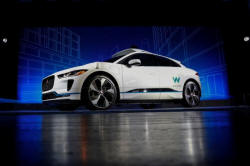U.S. plans to rewrite rules that impede self-driving
cars
 Send a link to a friend
Send a link to a friend
 [October 05, 2018]
By David Shepardson [October 05, 2018]
By David Shepardson
WASHINGTON (Reuters) - The Trump
administration is moving ahead with plans to revise safety rules that
bar fully self-driving cars from the roads without equipment such as
steering wheels, pedals and mirrors, according to a document made public
on Thursday.
The National Highway Traffic Safety Administration (NHTSA) "intends to
reconsider the necessity and appropriateness of its current safety
standards" as applied to automated vehicles, the U.S. Department of
Transportation said in an 80-page update of its principles dubbed
"Automated Vehicles 3.0."
The department, as reported by Reuters earlier on Thursday, disclosed
that the NHTSA wants comment "on proposed changes to particular safety
standards to accommodate automated vehicle technologies and the
possibility of setting exceptions to certain standards that are relevant
only when human drivers are present."
U.S. Transportation Secretary Elaine Chao released the document at a
department event. In the report, Chao said that self-driving cars have
the potential to dramatically reduce traffic crashes and road deaths.
But she added the "public has legitimate concerns about the safety,
security, and privacy of automated technology."

Automakers must currently meet nearly 75 auto safety standards, many of
which were written with the assumption that a licensed driver will be in
control of the vehicle.
General Motors Co in January filed a petition seeking an exemption for
the current rules to use vehicles without steering wheels and other
human controls as part of a ride-sharing fleet it plans to deploy in
2019.
NHTSA has not declared the GM petition complete, a step necessary before
it can rule on the merits. NHTSA said it plans to propose modernizing
procedures to follow when reviewing exemption petitions.
Alphabet Inc's Waymo unit plans to launch an autonomous ride-hailing
service for the general public with no human driver behind the steering
wheel in Arizona later this year. But unlike GM, Waymo's vehicles will
have human controls for the time being.
In March, a self-driving Uber Technologies Inc [UBER.UL] vehicle struck
and killed a pedestrian, while the backup safety driver was watching a
video, police said. Uber suspended testing in the aftermath and some
safety advocates said the crash showed the system was not safe enough to
be tested on public roads.
[to top of second column] |

A Jaguar I-PACE self-driving car is pictured during its unveiling by
Waymo in the Manhattan borough of New York City, U.S., March 27,
2018. REUTERS/Brendan McDermid

NHTSA has stepped up its self-driving car focus as legislation in Congress on
self-driving cars, which passed the U.S. House of Representatives in 2017, has
stalled. It has only a slender chance of being approved in 2018, congressional
aides said.
The report said "NHTSA's current statutory authority to establish motor vehicle
safety standards is sufficiently flexible to accommodate the design and
performance of different" automated vehicles.
The Center for Auto Safety said NHTSA should require companies to "submit
evidence" that their self-driving technology is safe "before involuntarily
involving human beings in their testing."
GM said in a statement on Thursday that "legislation is still urgently needed"
to allow "the full deployment of self-driving vehicles."
Automakers have warned it could take too long for NHTSA to rewrite the rules to
allow for the widespread of adoption of self-driving cars without human
controls.
The department also said it "no longer recognizes the designations of ten
automated vehicle proving grounds" announced in January 2017.
The sites, including a Michigan center that U.S. President Donald Trump visited
last year, were named by Congress to be eligible for $60 million in grants "to
fund demonstration projects that test the feasibility and safety" of
self-driving vehicles.
The Transportation Department also announced it will start studying the
workforce impacts of automated vehicles with the Labor, Commerce, and the Health
and Human Services departments.

The report also said the Trump administration will not support calls to end
human driving. The department "embraces the freedom of the open road, which
includes the freedom for Americans to drive their own vehicles."
(Reporting by David Shepardson; Editing by Muralikumar Anantharaman and Grant
McCool)
[© 2018 Thomson Reuters. All rights
reserved.] Copyright 2018 Reuters. All rights reserved. This material may not be published,
broadcast, rewritten or redistributed.
Thompson Reuters is solely responsible for this content. |